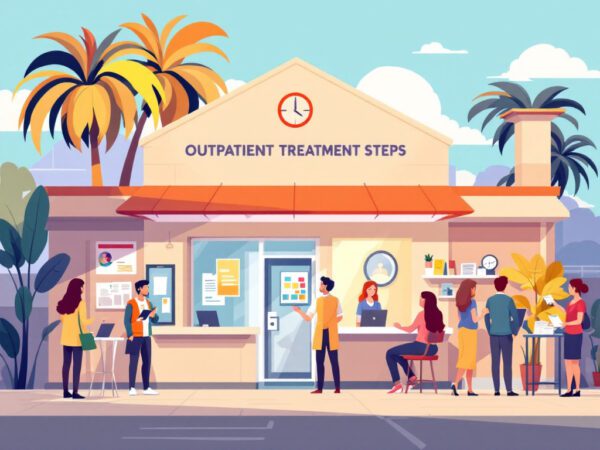Why Choose Totality Treatment
Choosing the right treatment facility is critical for effectively addressing PTSD and substance use disorders. At Totality Treatment, we offer specialized programs that incorporate comprehensive detoxification and effective rehab strategies tailored to meet individual needs.
Comprehensive Detox Programs
Our detox programs are designed to remove harmful substances safely and comfortably. We provide medically supervised detox, ensuring that patients receive the necessary support during this crucial first step. This approach minimizes withdrawal symptoms and reduces the risk of complications.
| Detox Program Type | Features |
|---|---|
| Medically Supervised Detox | Continuous monitoring, prescription of medications to ease withdrawal symptoms |
| Alcohol Detox Placement | Specialized treatment for alcohol dependence, support from trained professionals |
| Drug Detox Placement | Tailored programs for various substances, personalized care plans |
| Fentanyl Detox Placement | Focused strategies for opioids, addressing severe withdrawal symptoms |
| Benzo Detox Placement | Safe tapering strategies for benzodiazepine withdrawal |
Patients can expect a holistic approach that addresses both physical and emotional challenges, setting a strong foundation for successful outpatient addiction treatment.
Effective Rehab Strategies
Once detoxification is complete, we transition our clients to structured rehab programs focused on long-term recovery. Our strategies include a combination of evidence-based therapies, essential for full rehabilitation. We utilize Cognitive Behavioral Therapy (CBT), Eye Movement Desensitization and Reprocessing (EMDR), and Group Therapy, offering a comprehensive support system tailored to each individual.
| Rehab Strategy | Description |
|---|---|
| Cognitive Behavioral Therapy (CBT) | Helps patients identify and change negative thought patterns affecting their behavior and emotions (Moriah Behavioral Health) |
| Eye Movement Desensitization and Reprocessing (EMDR) | Focuses on processing traumatic memories to reduce their psychological impact |
| Group Therapy | Provides peer support and shared experiences, fostering community and understanding |
Incorporating these therapeutic approaches enhances our clients’ coping abilities and resilience in overcoming challenges. Through robust support and education on PTSD and addiction triggers, we empower individuals to manage their symptoms effectively (Moriah Behavioral Health).
Choosing Totality Treatment means choosing a dedicated path towards recovery with comprehensive support tailored to individual requirements. We invite you to explore our programs, including the intensive outpatient program and partial hospitalization program, to find the best fit for your journey or that of a loved one.
Outpatient Treatment Benefits
Choosing outpatient treatment for PTSD provides numerous advantages that support individuals on their recovery journey. We recognize the importance of flexibility, continuity, and the ability to integrate treatment into everyday life.
Flexibility in Scheduling
One of the primary benefits of outpatient treatment is the flexibility it offers. Participants can schedule their sessions around work, family commitments, and personal activities. This adaptability allows individuals to maintain their daily routines while receiving the necessary support for their mental health. According to Moriah Behavioral Health, flexibility in scheduling plays a vital role in effective treatment outcomes.
| Session Frequency | Potential Benefits |
|---|---|
| Once a week | Basic support and strategy reinforcement |
| Twice a week | Enhanced symptom reduction and support |
| More frequent (3x a week) | Maximizes treatment outcomes and engagement |
Continuity of Care
Continuity of care is essential for effective PTSD treatment. Research indicates that the timing of treatment sessions significantly influences outcomes. More frequent visits lead to larger decreases in PTSD symptoms (NCBI PMC). Regular interactions with therapists help in building relationships and trust, essential elements for effective therapy. As we maintain consistency in our approach, we help clients make steady progress toward their healing.
- Shorter Time Between Sessions: Keeping shorter intervals between sessions can lead to better outcomes, as consistent support bolsters healing.
- Structured Approach: Clear timelines involving regular appointments aid in keeping individuals engaged in their recovery process.
Integration into Daily Life
Outpatient treatment allows individuals to integrate mental health care into their daily lives without the disruption of residential programs. Participants continue to manage their responsibilities while applying learned coping strategies in real-world settings. This integration is crucial for solidifying the skills necessary to navigate life’s challenges post-treatment.
Benefits include:
- Maintaining work and personal relationships.
- Using therapeutic tools in everyday scenarios.
- Greater focus on holistic recovery, considering their life circumstances.
Incorporating outpatient care into our lives prepares us for long-term success by balancing support with personal independence. For more information on choosing the right outpatient treatment options, including intensive outpatient programs and other tailored solutions, we encourage exploring our range of resources. Each individual’s path to recovery is unique, and selecting the right program is a critical step in overcoming addiction and PTSD.
Therapeutic Approaches
In our commitment to providing effective PTSD outpatient treatment, we recognize the importance of incorporating varied therapeutic approaches. The following methods—Cognitive Behavioral Therapy (CBT), Eye Movement Desensitization and Reprocessing (EMDR), and Group Therapy—have been shown to yield significant benefits for individuals undergoing treatment.
Cognitive Behavioral Therapy (CBT)
Cognitive Behavioral Therapy (CBT) is a widely used therapeutic approach in the treatment of PTSD. This method focuses on changing negative thought patterns and behaviors associated with trauma. Through structured sessions, individuals learn to identify and challenge these patterns, replacing them with healthier mindsets.
Research indicates that a combination of therapeutic approaches can be more effective. In fact, integrating art therapy with cognitive processing therapy has led to statistically significant improvements in reducing PTSD symptoms among military populations (NCBI). For many, CBT serves as a foundational element in overcoming the challenges posed by PTSD.
Eye Movement Desensitization and Reprocessing (EMDR)
Eye Movement Desensitization and Reprocessing (EMDR) is another powerful tool in the treatment arsenal for PTSD. This approach helps individuals process and integrate traumatic memories through guided eye movements or other forms of bilateral stimulation. EMDR has proven effective in alleviating symptoms of anxiety, depression, and PTSD when integrated into broader treatment strategies.
A study highlighted the efficacy of combining EMDR with physical exercise and psychoeducation during intensive outpatient therapy. This comprehensive approach is particularly effective for those experiencing PTSD due to multiple traumatizations. Our programs emphasize the use of EMDR as part of a multi-faceted treatment plan.
Group Therapy
Group Therapy offers a supportive environment where individuals can share their experiences with others who understand their challenges. This sense of community can be crucial for those dealing with PTSD, as it fosters connection and reduces feelings of isolation.
Participants often benefit from diverse perspectives and coping strategies shared within the group setting. More frequent scheduling of group sessions, such as twice a week, can maximize treatment outcomes and facilitate deeper connections (NCBI PMC). Our outpatient programs provide structured opportunities for group therapy, enabling individuals to gain support while actively engaging in their recovery journey.
By utilizing these therapeutic approaches, we aim to tailor our outpatient addiction treatment plans to meet the unique needs of each individual. Our goal is to equip participants with the tools necessary for lasting recovery and improved quality of life.
Medication in PTSD Treatment
In our exploration of PTSD outpatient treatment, we recognize the importance of medication as a supportive tool in the recovery journey. Medications such as antidepressants and anti-anxiety medications play a significant role in managing symptoms associated with PTSD.
Antidepressants
Antidepressants, particularly selective serotonin reuptake inhibitors (SSRIs), are commonly prescribed to help manage the symptoms of depression and anxiety in individuals with PTSD. Studies indicate that these medications can effectively reduce intrusive thoughts and improve overall mood (Moriah Behavioral Health).
The table below outlines common types of antidepressants used in PTSD treatment along with their potential benefits:
| Type of Antidepressant | Examples | Benefits |
|---|---|---|
| SSRIs | Fluoxetine, Sertraline | Reduces anxiety and depression symptoms |
| SNRIs | Venlafaxine | Alleviates mood symptoms and helps with physical symptoms of anxiety |
Effective treatment often involves continuous monitoring by healthcare professionals to tailor the medication regimen to each individual’s needs.
Anti-anxiety Medications
Anti-anxiety medications, often categorized as benzodiazepines, are also used in PTSD treatment. While they can provide quick relief from acute anxiety symptoms, they may not be as effective long-term when managing PTSD. They are most beneficial when used in conjunction with therapies that foster coping skills and emotional regulation.
Here’s a summary of the types and uses of anti-anxiety medications:
| Type of Anti-anxiety Medications | Examples | Uses |
|---|---|---|
| Benzodiazepines | Lorazepam, Diazepam | Provides immediate relief from anxiety symptoms |
The long-term use of these medications should be carefully considered, as they can lead to dependence. Combining medication with therapeutic approaches, as seen in effective outpatient programs, enhances the overall effectiveness of treatment for PTSD. Research shows that more frequent sessions yield greater reductions in PTSD symptoms, emphasizing the synergy between medication management and consistent therapeutic support (NCBI Bookshelf).
Incorporating medication management into a comprehensive treatment plan, including outpatient addiction treatment options, can lead to significant improvements in mental health, allowing individuals to reclaim their lives from the grips of PTSD. For more information on our various treatment options, please explore links related to our intensive outpatient program and outpatient program.
Lifestyle Support and Education
In our journey towards effective PTSD outpatient treatment, lifestyle support and education play a crucial role. They help individuals develop coping strategies and stress management techniques while providing them with valuable insights about PTSD and its triggers.
Coping Strategies
Coping strategies are essential tools in managing PTSD symptoms. We encourage individuals to adopt various techniques to help navigate their experiences and emotions. Some effective coping strategies include:
| Strategy | Description |
|---|---|
| Mindfulness Meditation | Focuses on breathing and staying present, helping reduce anxiety and stress. |
| Journaling | Writing down thoughts and feelings to process emotions and reflect on experiences. |
| Physical Activity | Engaging in regular exercise to release endorphins and improve mood. |
| Creative Outlets | Participating in art, music, or other creative activities to express emotions. |
| Support Networks | Building relationships with friends, family, or support groups for encouragement. |
These strategies can empower individuals to manage their symptoms more effectively while focusing on personal growth.
Stress Management Techniques
Implementing stress management techniques is vital for those undergoing treatment for PTSD. By learning to manage stress, individuals can improve their overall well-being and quality of life. Here are some widely used techniques:
| Technique | Description |
|---|---|
| Deep Breathing | Taking slow, deep breaths to lower heart rate and promote relaxation. |
| Progressive Muscle Relaxation | Tensing and relaxing muscle groups to alleviate physical tension. |
| Time Management | Prioritizing tasks and creating a schedule to reduce feelings of overwhelm. |
| Healthy Lifestyle | Maintaining a balanced diet, regular sleep patterns, and staying hydrated for better mental health. |
| Seeking Professional Help | Working with therapists or counselors to develop personalized stress management plans. |
These stress management techniques are aimed at reducing symptoms of anxiety and improving emotional regulation during treatment. By integrating these approaches into our everyday lives, we pave the way for more effective treatment outcomes.
For those seeking to enhance their recovery journey while integrating professional support, exploring options like outpatient addiction treatment or an intensive outpatient program can provide the necessary resources and structure.
Success Stories and Research Findings
Reduction in Symptoms
Outpatient treatment for PTSD has been demonstrated to be effective in significantly reducing symptoms. Research indicates that patients undergoing an intensive six-day outpatient trauma-focused treatment experienced a notable decline in PTSD symptoms from pretreatment to follow-up after one month, with a Cohen’s d of 1.13. This improvement was maintained at the six-month follow-up, showing a Cohen’s d of 1.47, indicating a substantial and lasting impact.
Moreover, the effectiveness of outpatient therapy is underscored by the following:
| Metric | Outcome |
|---|---|
| Patients meeting diagnostic criteria pre-treatment | 100% |
| Patients no longer meeting criteria after one month | 52.4% |
| Improvement on CAPS-5 assessment | 73.9% |
| Improvement on PCL-5 assessment | 77.61% |
These statistics illustrate the efficacy of outpatient treatment programs in facilitating symptom relief and promoting healing.
Improvement in Quality of Life
In addition to symptom reduction, outpatient treatment also plays a vital role in enhancing the overall quality of life for those affected by PTSD. Patients have reported positive changes in their daily functioning and emotional well-being as a result of engaging in therapeutic approaches like Cognitive Behavioral Therapy (CBT), Eye Movement Desensitization and Reprocessing (EMDR), and group therapy. These interventions not only help alleviate symptoms but also foster a supportive community environment that can be crucial for recovery.
Implementing integrative therapies, such as art therapy alongside Cognitive Processing Therapy (CPT), has shown statistically significant results in reducing symptoms and improving mood among military populations received in intensive outpatient programs. Participants rated art therapy as more beneficial than CPT alone, highlighting the diverse approaches within treatment that contribute to enhanced quality of life and overall healing (NCBI).
By choosing Totality Treatment and participating in outpatient programs, patients are not only working toward reducing their PTSD symptoms but also reclaiming a fulfilling quality of life. If you or someone you know is seeking options for PTSD outpatient treatment, we encourage exploring our tailored programs that aim to support healing and recovery.















